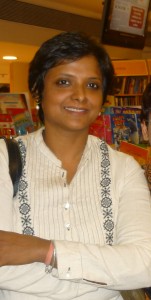Popular Prakashan’s Vinitha Ramchandani describes the author habits that drive her crazy. Plus, tips on pitching your book to publishers.
by The Editors | editor@themetrognome.in
 Popular Prakashan is 85 years old, and though better-known for its non-fiction offerings, the publishing house also delves into fiction and children’s books. We got its editor Vinitha Ramchandani to tell us several things – like the stories she is most likely to pick up, what she thinks about Chetan Bhagat’s style of writing, and what authors should and should not do.
Popular Prakashan is 85 years old, and though better-known for its non-fiction offerings, the publishing house also delves into fiction and children’s books. We got its editor Vinitha Ramchandani to tell us several things – like the stories she is most likely to pick up, what she thinks about Chetan Bhagat’s style of writing, and what authors should and should not do.
Is there a thumb rule for selecting a manuscript for publishing?
At Popular Prakashan we do both non-fiction as well as fiction, and we get all kinds of manuscripts. For non-fiction, we look for depth in research, strong language and what the MS (manuscript) is trying to convey. When it comes to fiction, it is how well the story catches one’s attention. Anything that is absorbing, basically. Fact is, when a manuscript comes in to a publisher, anything that has bad language is a no-no, a total put off.
In recent times, especially after Chetan Bhagat came out with books that were completely Indian in sensibility, a lot of people have started writing books. What is your take on this trend, where every person with a story to tell is writing a book?
Chetan Bhagat made big money by selling large numbers. However we’ve had Indian authors who wrote with Indian sensibilities for ages now! Rabindranath Tagore, RK Narayan, Mukul Raj Anand, Khushwant Singh and Satyajit Ray are icons who wrote in English and for and about ordinary Indians. Contemporary greats like Salman Rushdie, Amitav Ghosh, Arundhati Roy, Kiran Nagarkar…the list is endless. It is a pity if all we can remember is Chetan Bhagat, who simply has mastered the technique of selling mediocre work.
Yes, everyone does have a story to tell, however not all tales get told. When you get into the world of book publishing, you will realise that the competition to get printed is tough. However blogging, self-publishing and e-books are becoming big and yes, if you are certain that this is what you want [to do], then there are more and more options that are opening up.
What are some common author habits that drive editors up the wall?
Authors who have one book that they do a year or two (of course, there are some who write more than three to four books a year) forget that publishers do more than one book, and that we have many authors who we deal with at the same time. The other thing that can be exasperating, is when an author travels to, say Hubli, to a tiny store there and calls us up demanding why they didn’t find their book there. The third is when authors constantly expect publishers to do PR work for their book through the year, year after year.
In your experience, has there been an author(s) who has been really difficult to work with? Why?
Oh yes! I’ve had a couple of authors who want everything they demand overnight or—better still—right away. These are the ones who are brand names. Then there was one who wrote a mail to me and copied the management on it, and something like that can really ruin an author-publisher relationship. Mostly though, I’ve worked with authors who are understanding and have been patient. Some of the brilliant social sciences authors are simple, look completely unassuming in their chappals and kurtas, carrying their MS in a cloth bag…one can’t help but feel humble in front of their work.
What should first-time authors bear in mind when sending manuscripts for evaluation?
One, send your manuscript with a good cover letter, which talks a bit about the work being sent and about the process of writing as well as the author. In today’s day and time, when there is so much advice that you can access online, it continues to amaze me that there are people who send manuscripts with one-line cover letters. Trust me, who you are, how old you are, and how you can sell yourself, all help to create a base before I even open and read the MS. Of course, a good MS is unbeatable, and no matter how curt you cover letter is, if you have a good MS then there is nothing to worry.
Two, research publishing houses. Find out what kinds of books each publishing house is inclined to do. Sending your adult fiction to a publishing house that prefers to do children’s fiction is self-defeating. Or, if it is short stories that you are writing, then look up and see which publishing house prefers to publish short stories.
Three, and I never did this but if I ever write again this is what I will do: (a) Send your MS to as many publishing houses as possible. (b) Make an excel sheet and jot down the place (publisher) you send your MS to, the person who you addressed it to, the date you sent it and if possible, the date in which you received an acknowledgment of their receipt of it. (c) Wait patiently for a month and then start sending reminders – polite ones.
Of the many famous writers based in Mumbai and writing on it, or taking inspiration from the city, who are your favourites?
Kiran Nagarkar is my favourite Mumbai-based writer. There are others too, like Suketu Mehta, Vikram Chandra, Salman Rushdie, Kiran Desai, Anil Dharkar, Upamanyu Chatterjee. All of them have powerful ways of telling a story.
In your opinion, who are the writers to watch out for in Mumbai?
Why stick to Mumbai? Writing should not have geographical boundaries. I think Siddharth Dhanvant Sanghvi is a novelist to watch out for. But I usually read children’s fiction and I love the work that a handful of Indian writers are coming out with, pan India.
(Featured picture courtesy www.selfpublishingreview.com)
